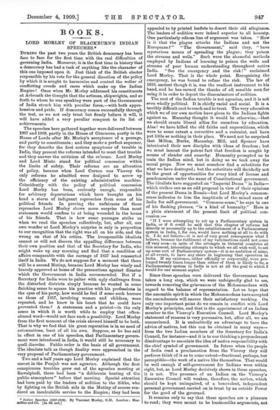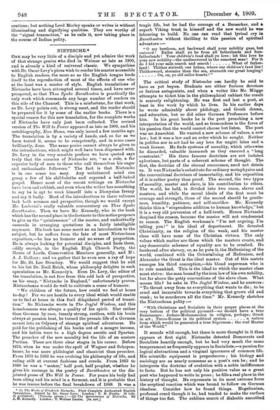BOOKS.
LORD MORLEY OF BLACKBURN'S INDIAN SPEECHES.* MIRING the past two years the British democracy has been face to face for the first time with the real difficulties of governing India. Moreover, it is the first time in history that a democracy has bad a task of anything like the character of this one imposed upon it. Just think of the British elector responsible by his vote for the general direction of the policy by which it is sought to harmonise and control the welter of conflicting creeds and races which make up the Indian Empire Once when Mr. Morley addressed his constituents at Arbroath the thought that the artisans, shipwrights, and so forth to whom he was speaking were part of the Government of India struck him with peculiar force,—with both appre- hension and pride. If democracy comes successfully through the test, as we not only trust but firmly believe it will, it will have added a very peculiar conquest to its list of achievements.
The speeches here gathered together were delivered between 1907 and 1909, partly in the House of Commons, partly in the House of Lords after Mr. Morley's acceptance of a peerage, and partly to constituents ; and they make a perfect sequence, for they describe the first serious symptoms of trouble in India, they present the reforms intended to meet that trouble and they answer the criticism of the reforms. Lord Morley and Lord Minto stand for political concession within the limits of safety. Their reforms are an alteration of policy, because when Lord Curzon was Viceroy the only reforms he admitted were designed to screw up the efficiency of the existing administrative machine. Coincidently with the policy of political concession Lord Morley has been, curiously enough, responsible for arbitrary deportations which have brought on his head a storm of indignant reproaches from some of his political friends. In proving the unfairness of those reproaches Lord Morley shows more surprise than most statesmen would confess to at being wounded in the house of his friends. That is how some passages strike us when we read the speeches collectively, brit, after all, our own wonder at Lord Morley's surprise is only in proportion to our recognition that the right was all on his side, and the wrong on that of his critics. The irresponsible idealists cannot or will not discern the appalling difference between their own position and that of the Secretary for India, who might wake up any morning and-find that a condition of affairs comparable with the carnage of 1857 had reasserted itself in India. We do not suppose for a moment that there will be a second Mutiny, because Lord Morley has wisely and bravely approved at home of the precautions against disaster .which the Government in India recommended. But if a Secretary for India were to palter with ugly challenges from the disturbed districts simply because he wanted in some finicking sense to square his practice with his professions in the eyes of his party, how would he feel if some such horrors as those of 1857, involving women and children, were repeated, and he knew in his heart that he could have prevented them ? A statesman and a patriot—in the only sense in which it is worth while -to employ that often- abused word—would not face such a possibility. Lord Morley from the first moment of the crisis showed himself to be both. That is why we feel that his great reputation is in no need of extenuation, least of all his own. Suppose, as he has said in effect in one of his speeches, that Parliamentary govern- ment were introduced in India, it would still be necessary to quell disorder. Public order is the basis of all government. The idealists talk as though finality were approached in the very proposal of Parliamentary government.
Two and a half years ago Lord Morley explained that the unrest in the Punjab was not agrarian. Although the first conspicuous troubles grew out of the agrarian meeting at Rawalpindi, there had been "a deliberate heating of the public atmosphere" before that meeting. Special attention had been paid by the leaders of sedition to the Sikhs, who by fighting on the British side in the Mutiny of course ren- dered an incalculable service to the Empire; they had been
• Indian Speeches (1007-1909). By Viscount Morley, O.M. London : Mon- =Man and Co. [2s. 6d. net.;
appealed to by printed leaflets to desert their old allegiance. The leaders of sedition were indeed superior to all honesty. One particularly odious line of argument was taken. " How is it that the plague attacks the Indians and not the Europeans P " " The Government," said they, " have mysterious means of spreading the plague ; they poison the streams and wells." Such were the shameful methods employed by Indians of learning to poison the wells and streams of poor human understanding throughout native India. " See the emergency and the risk ! " exclaimed Lord Morley. That is the whole point. Recognising the emergency, be was bound to refuse the risk. The law of 1818, ancient though it is, was the readiest instrument to bis hand, and he has earned the thanks of all sensible men for using it in order to deport the disseminators of sedition.
The root of the Indian trouble is not agrarian, and it is not even wholly political. It is chiefly racial and social. It is a terribly difficult root to reach and to treat. The very education which we of our own motion have given to the Indians fights against us. Macaulay thought it would be otherwise,—that we should create liberal allies for ourselves by education. Alas ! we have killed the old faiths and superstitions, which were to some extent a corrective and a restraint, and have put little or nothing in their place. We need not be surprised that Milton, Burke, Macaulay, Mill, and Spencer have intoxicated their new disciples with ideas of freedom ; but we must lament the patent fact that freedom is sought by means of slander and anarchy. Humanity prompted us to train the Indian mind, but in doing so we took away the moral props. Now we must somehow find a, substitute for what we have destroyed; but the substitute will decidedly not be the grant of opportunities for every kind of license and
pandemonium under the name of Constitutional government. The idealists have suggested an "Imperial Duma" in India—
which strikes one as an odd proposal in view of their opinions of the present Duma in Russia—but Lord Morley's common- sense indicates to him the inaptitude of the mixed races of India for self-government. "Common-sense," he says in one of his flashing phrases, "is a kind of humanity." Here is a plain statement of the present limit of political con- cession :-
" If I were attempting to set up a Parliamentary system in India, or if it could be said that this chapter of reforms led directly or necessarily up to the establishment of a Parliamentary system in India, I, for one, would have nothing at all to do with it. I do not believe—it is not of very great consequence what I believe, because the fulfilment of my vaticinations could not come off very soon—in spite of the attempts in Oriental countries at this moment, interesting attempts to which we all wish well, to set up some sort of Parliamentary system—it is no ambition of mine, at all events, to have any share in beginning that operation in India. If my existence, either officially or corporeally, wore pro- longed twenty times longer than either of them is likely to be, a Parliamentary system in India is not at all the goal to which I would for one moment aspire."
Since these speeches were delivered the Government have taken a long step, which we were unfeignedly glad to see, towards removing the grievances of the Mohammedans with regard to the balance of representation. Let us hope that the amenable spirit in which the Mohammedans have accepted
the amendments will ensure their satisfactory working. On only one important point do we remain in conflict with Lord Morley's principles, and that is the appointment of an Indian member to the Viceroy's Executive Council. Lord Morley's statement of reasons is very persuasive, but, after all, we are unconvinced. It is undoubtedly an advantage to have the advice of natives, but this can be obtained in many ways—
from the two Indian members of the Secretary for India's Council, for instance—and it is to our thinking a preponderant disadvantage to associate the idea of native responsibility with the chief symbol of government. In future when the people of India read a proclamation from the Viceroy they will perforce think of it as to some extent—fractional, perhaps, but perceptible—the work of a native like themselves. That would be well enough if self-government for Indians were within
sight, but, as Lord Morley decisively shows in these speeches, it is not. The presence of an Indian on the Viceroy's Executive Council will weaken, therefore, the notion, whioh should be kept unimpaired, of a benevolent, independent personal government carried on in trust by an outside Power for the good of the governed.
It remains only to say that these speeches are a pleasure to read; they were meant to be businesslike arguments, not
orations; but nothing Lord Morley speaks or writes is without illuminating and dignifying qualities. They are worthy of the " signal transaction," as he calls it, now taking place in the course of Indian polity.







































































 Previous page
Previous page